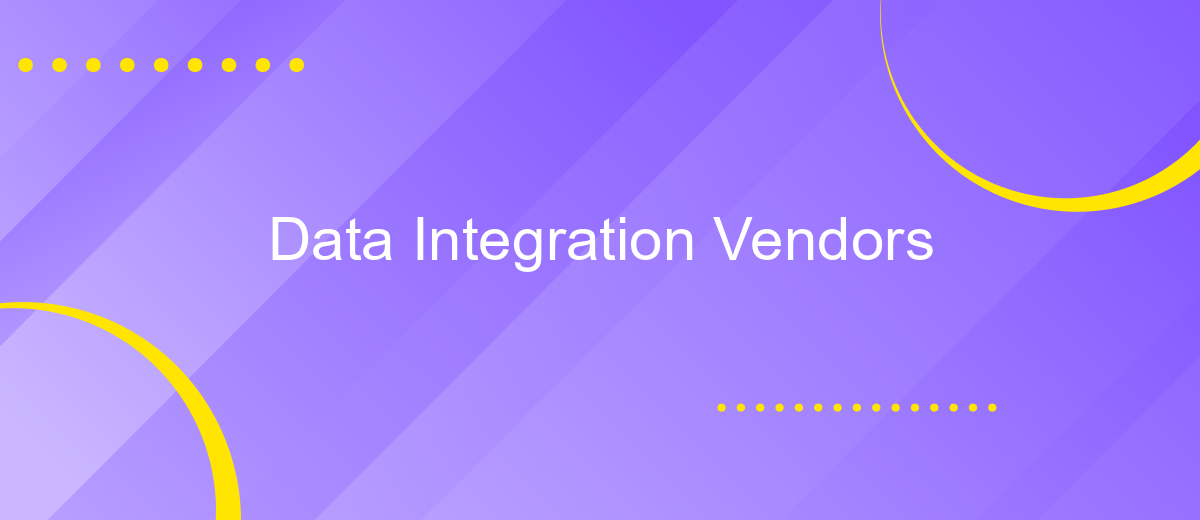Data Integration Vendors
In today's data-driven world, businesses rely heavily on seamless data integration to harness the full potential of their information assets. Data integration vendors play a crucial role in this process by providing tools and solutions that enable organizations to consolidate, manage, and analyze data from diverse sources. This article explores the leading data integration vendors, their offerings, and how they can transform your data strategy.
Overview
Data integration vendors play a crucial role in helping organizations streamline their data management processes. These vendors provide tools and services that enable businesses to combine data from disparate sources into a unified view, facilitating better decision-making and operational efficiency.
- Centralized data management
- Enhanced data quality and consistency
- Improved data accessibility and sharing
- Scalability to handle growing data volumes
One such service is ApiX-Drive, which offers a user-friendly platform for setting up integrations without the need for coding skills. ApiX-Drive supports a wide range of applications, allowing businesses to automate workflows and ensure seamless data flow between systems. By leveraging these tools, companies can reduce manual data handling, minimize errors, and focus on strategic initiatives.
Key Considerations

When selecting a data integration vendor, it is crucial to evaluate the scalability of their solutions. Your organization's data needs will likely grow over time, and the chosen vendor must be able to accommodate this growth. Consider whether the vendor offers flexible pricing models that can adapt as your data volume increases. Additionally, assess the ease of use and the learning curve associated with the vendor's tools, as a user-friendly interface can significantly reduce the time and resources needed for implementation.
Another key consideration is the range of supported data sources and destinations. Ensure that the vendor can seamlessly integrate with the various systems and applications your organization uses. For instance, ApiX-Drive is known for its extensive library of pre-built connectors, making it easier to link disparate data sources without extensive custom coding. Furthermore, evaluate the vendor's support and customer service, as timely assistance can be critical in resolving any integration issues that arise.
Vendor Landscape

The landscape of data integration vendors is diverse, offering a range of solutions to meet various business needs. These vendors provide tools and platforms that enable seamless data integration across multiple systems, ensuring data consistency and accessibility.
- ApiX-Drive: A versatile integration platform that allows businesses to connect various applications and automate workflows without the need for coding.
- Informatica: Known for its robust data integration solutions, Informatica offers tools for data management, quality, and governance.
- Talend: Provides open-source and subscription-based data integration software that supports big data and cloud integration.
- MuleSoft: A leader in API-led connectivity, MuleSoft enables organizations to build application networks with secure and reusable APIs.
- Microsoft Azure Data Factory: A cloud-based data integration service that allows the creation of data-driven workflows for orchestrating data movement and transformation.
Choosing the right data integration vendor depends on several factors, including the specific requirements of your business, the complexity of your data environment, and budget constraints. ApiX-Drive, for instance, is ideal for businesses looking for a user-friendly, no-code solution to automate and streamline their data workflows.
Integration Patterns

Integration patterns are essential for ensuring seamless data flow between disparate systems. These patterns help in defining standardized methods for integrating data, which can significantly reduce complexity and improve efficiency. By utilizing well-established integration patterns, businesses can achieve greater agility and scalability in their data management processes.
One of the key aspects of integration patterns is the ability to handle various data formats and protocols. This is where services like ApiX-Drive come into play, offering a versatile platform for connecting different applications and automating data transfers. ApiX-Drive supports a wide range of integrations, making it easier for organizations to synchronize their data across multiple systems without extensive manual intervention.
- Data Aggregation: Combining data from multiple sources into a single, unified view.
- Data Transformation: Converting data into the required format for the target system.
- Data Replication: Synchronizing data between systems to ensure consistency.
- Event-Driven Integration: Triggering actions based on specific events or changes in data.
By leveraging these integration patterns, businesses can streamline their operations and enhance their decision-making capabilities. Tools like ApiX-Drive not only simplify the integration process but also provide robust support for maintaining data integrity and consistency across various platforms.


Future Trends
As data integration continues to evolve, several key trends are shaping its future. One such trend is the growing adoption of artificial intelligence and machine learning to enhance data integration processes. These technologies enable more efficient data mapping, transformation, and anomaly detection, reducing the manual effort required and increasing accuracy. Additionally, the rise of cloud-based integration platforms is making it easier for organizations to manage and scale their data integration efforts without the need for extensive on-premises infrastructure.
Another significant trend is the increasing importance of real-time data integration. Businesses are demanding faster insights and decision-making capabilities, which require the ability to integrate and process data in real-time. Services like ApiX-Drive are leading the way by providing user-friendly tools that allow for seamless integration across various applications and data sources. This not only simplifies the integration process but also ensures that data is always up-to-date and readily available for analysis. As these trends continue to develop, the landscape of data integration will become even more dynamic and efficient.
FAQ
What is data integration, and why is it important?
How can data integration vendors help my business?
What should I consider when choosing a data integration vendor?
How do data integration tools handle data security?
Can data integration be automated?
Routine tasks take a lot of time from employees? Do they burn out, do not have enough working day for the main duties and important things? Do you understand that the only way out of this situation in modern realities is automation? Try Apix-Drive for free and make sure that the online connector in 5 minutes of setting up integration will remove a significant part of the routine from your life and free up time for you and your employees.

